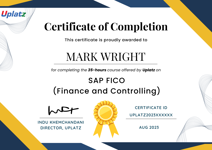
Premium Career Track - Chief Human Resources Officer (CHRO)
Program consisting of courses to help you fulfil your dream of becoming a C-Level Executive (CHRO) in a top organization
Uplatz
Summary
- Uplatz Certificate of Completion - Free
Add to basket or enquire
Overview
Uplatz provides this intense Premium Career Track program on Chief Human Resources Officer (CHRO). It is a program covering all topics related to Human Resources (HR) leadership and management, and more, as self-paced video lectures. The program will help you pursue a career towards becoming a CDO. You will be awarded Course Completion Certificate at the end of the course.
This Premium Career Track - Chief Human Resources Officer (CHRO) program by Uplatz includes the following courses:
1. SAP HCM (Human Capital Management)
2. SAP HCM (basic to advanced)
3. SAP SuccessFactors Employee Central
4. SAP SuccessFactors Employee Central (end-to-end)
5. SAP SuccessFactors Recruiting (RCM) and HXM Talent Management
6. SAP SuccessFactors Onboarding 2.0
7. SAP SuccessFactors Performance and Goals
8. SAP SuccessFactors Compensation
9. SAP SuccessFactors Succession and Development
10. Leadership and Management
A CHRO, or Chief Human Resources Officer, is a top executive in an organization responsible for overseeing all aspects of human resources management and development. Their roles and responsibilities typically include:
Strategic Leadership: As a member of the executive team, the CHRO contributes to the development and implementation of the organization's overall strategic goals and objectives, especially those related to human capital.
Talent Acquisition and Management: The CHRO oversees the recruitment, hiring, and retention of employees. This includes developing recruitment strategies, managing hiring processes, and ensuring the organization attracts and retains top talent.
Employee Development and Training: They are responsible for designing and implementing employee training and development programs to enhance skills and capabilities within the organization. This involves identifying training needs, selecting appropriate training methods, and evaluating the effectiveness of training initiatives.
Performance Management: The CHRO establishes performance management systems and processes to evaluate employee performance, provide feedback, and facilitate goal-setting and career development.
Compensation and Benefits: They oversee the design and administration of compensation and benefits programs, ensuring they are competitive, equitable, and aligned with the organization's goals and budget.
Employee Relations: The CHRO handles employee relations issues, including conflicts, grievances, and disciplinary actions. They may also be involved in promoting a positive organizational culture and fostering employee engagement and morale.
Compliance and Legal Affairs: Ensuring compliance with employment laws and regulations is a crucial responsibility of the CHRO. They must stay informed about relevant laws and regulations and ensure the organization's policies and practices adhere to them.
HR Technology and Data Analytics: With the increasing role of technology in HR, the CHRO often oversees the implementation and management of HR information systems (HRIS) and other technologies to streamline HR processes and enhance data analytics capabilities.
Diversity, Equity, and Inclusion (DEI): Many CHROs are tasked with developing and implementing strategies to promote diversity, equity, and inclusion within the organization, fostering a culture of belonging and respect for all employees.
The CHRO plays a critical role in shaping the organization's culture, maximizing employee performance and engagement, and driving strategic workforce initiatives to support the achievement of business objectives.
Course media
Description
To excel as a Chief Human Resources Officer (CHRO), individuals typically need a combination of skills, experience, and qualities. Here are some key skills required by CHROs and how to acquire them:
Leadership Skills: CHROs need strong leadership abilities to guide their HR teams effectively and influence organizational strategy. Leadership skills can be developed through formal leadership training programs, executive coaching, and on-the-job experience in leadership roles.
Strategic Thinking: CHROs must be able to think strategically and align HR initiatives with the organization's overall goals and objectives. Developing strategic thinking skills often involves gaining a deep understanding of the business, staying informed about industry trends, and participating in strategic planning processes.
Communication Skills: Effective communication is essential for CHROs to convey HR policies, initiatives, and decisions clearly to employees, senior executives, and external stakeholders. Communication skills can be honed through practice, public speaking courses, and workshops on interpersonal communication.
Change Management: CHROs frequently lead organizational change initiatives, so they need strong change management skills to navigate resistance and drive successful transformations. Developing change management expertise may involve studying change management frameworks, obtaining certifications, and gaining experience in change leadership roles.
Problem-Solving and Decision-Making: CHROs encounter complex HR challenges that require analytical thinking, problem-solving, and sound decision-making skills. Enhancing these skills can be achieved through critical thinking exercises, decision-making workshops, and seeking opportunities to solve HR-related problems.
Strategic HR Planning: CHROs are responsible for developing and executing HR strategies that support business objectives. Acquiring skills in strategic HR planning involves studying HR strategy frameworks, attending HR strategy seminars, and gaining experience in developing and implementing HR initiatives aligned with organizational goals.
Emotional Intelligence (EI): CHROs must possess high emotional intelligence to understand and manage their own emotions effectively and empathize with others. Improving EI skills may involve self-awareness exercises, empathy training, and practicing active listening in interpersonal interactions.
HR Functional Expertise: CHROs need a solid understanding of all aspects of human resources management, including talent acquisition, performance management, compensation and benefits, employee relations, and HR technology. Acquiring HR functional expertise typically involves obtaining a degree in HR or a related field, gaining HR experience through internships and entry-level roles, and pursuing professional HR certifications (e.g., SHRM-SCP, SPHR).
Business Acumen: CHROs need to understand the broader business context in which HR operates and how HR initiatives contribute to organizational success. Developing business acumen involves studying business fundamentals, collaborating with colleagues from other functional areas, and seeking opportunities to contribute to cross-functional projects.
Continuous Learning and Development: The HR landscape is constantly evolving, so CHROs must be committed to continuous learning and professional development. This may involve attending HR conferences, participating in industry networking events, pursuing advanced degrees or certifications, and staying updated on emerging HR trends and best practices.
By focusing on developing these skills and qualities, aspiring CHROs can position themselves for success in leading HR functions and driving organizational excellence.
Who is this course for?
Everyone
Requirements
Passion and determination to make it to the top of the corporate ladder!
Career path
- Chief Human Resources Officer (CHRO)
- HR Business Partner
- HR Manager and Senior HR Manager
- People Business Partner
- Chief Strategy Officer (CSO)
- Chief Executive Officer (CEO)
- Personnel Manager
- HR Consultant
- HCM Specialist
Questions and answers
Currently there are no Q&As for this course. Be the first to ask a question.
Certificates
Uplatz Certificate of Completion
Digital certificate - Included
Course Completion Certificate by Uplatz
Reviews
Currently there are no reviews for this course. Be the first to leave a review.
Legal information
This course is advertised on reed.co.uk by the Course Provider, whose terms and conditions apply. Purchases are made directly from the Course Provider, and as such, content and materials are supplied by the Course Provider directly. Reed is acting as agent and not reseller in relation to this course. Reed's only responsibility is to facilitate your payment for the course. It is your responsibility to review and agree to the Course Provider's terms and conditions and satisfy yourself as to the suitability of the course you intend to purchase. Reed will not have any responsibility for the content of the course and/or associated materials.



